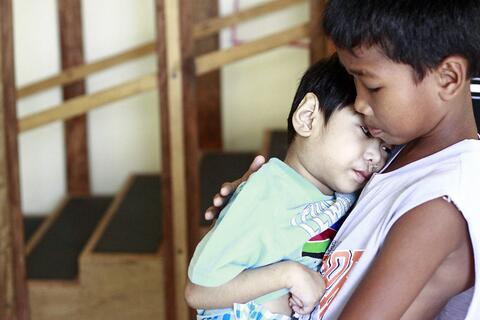Parentification: The impact of children taking on parental roles in their family

We expect parents to always take care of their children’s physical and emotional needs. But sometimes the roles are reversed, and the child assumes responsibilities beyond what is appropriate for their age – a phenomenon known as parentification.
Adults may be unable to fulfill their parental duties for many reasons, and it can have serious consequences for their children. A new study from the University of Illinois Urbana-Champaign reviews academic literature on parentification, identifying causes and outcomes in populations around the world.
“Parentification is more than increasing independence or additional household chores, it’s taking on activities that adults should be doing. The earlier it starts and the longer it lasts, the more negative the outcomes will be for the children if they don’t have an adequate support system,” said lead author Jacinda K. Dariotis, professor in the Department of Human Development and Family Studies and director of the Family Resiliency Center, both part of the College of Agricultural, Consumer and Environmental Sciences (ACES). Dariotis is also a Health Innovation Professor in the Carle Illinois College of Medicine at the U. of I.
“The two main types of parentification are instrumental tasks, such as bringing in money to the household, and emotional tasks, such as becoming a confidant to a parent. Often, the two types go hand in hand,” she added. “Families that are experiencing some form of trauma may suffer from depleted resources as well as emotional distress.”
The researchers reviewed 95 papers from 19 countries on six continents, underscoring that parentification is a global phenomenon. Some studies included community samples, while others focused on specific populations, such as immigrants and refugees or children with HIV/AIDS-infected mothers.
“There are lots of different reasons why parents experience stressors and trauma in different environments. In some countries it may be war and displacement; in the U.S., parents may be suffering from serious illness, mental health problems, substance use, or domestic violence. The sources of parentification vary, but the result is that sometimes families are so overtaxed that major responsibilities shift to the children,” Dariotis stated.
A parentified child may become a household earner, self-carer, language and cultural broker, self-educator, counselor, confidant, caregiver, or emotional supporter for parents or siblings.

Estimates of how common the phenomenon is range from a few percent to over 30% of youth. The latter reflects an estimate from Poland that focused on consequences of the COVID-19 pandemic, when many families experienced illness, death, or job loss, and children often had to take care of their own education.
The researchers identified several common themes from the studies, finding that parentification can lead to a multitude of serious problems.
“There is a potential for dropping out of school if children have to work or help care for their parents and siblings. Lack of education has long-term consequences for employment and income, which in turn affects health status. They may also lose their friend network if they don’t have time to socialize, and they may resent missing out on childhood,” Dariotis explained.
Youth who are parentified are more likely to engage in unhealthy coping strategies such as risky sexual behaviors and substance use. They may have difficulties in developing long-term deep relationships because they lack trust or feel overly responsible for the wellbeing of others. Furthermore, they may continue the pattern with their own children, so the problem becomes intergenerational.
Dariotis noted that although studied outcomes are mostly negative, in some cases parentification can lead to positive effects. Taking on adult responsibilities can help youth develop resilience, strength, and maturity, especially if they feel their efforts are appreciated, they regard their role in the family as fair, and there is a social network in place to support them. Parentification can also lead to stronger sibling bonds and promote empathy, understanding, and acceptance of others. Additional research is needed to explore how and when parentification is linked to positive outcomes.
The researchers conclude it is important to recognize and identify the prevalence of parentification and establish policies that provide the necessary support.
“Ultimately, parents want what is best for their children, and they are not actively trying to parentify them. Parents should not be stigmatized; they are not doing this on purpose,” Dariotis said. “Regardless of the source of parentification, we have to accept it’s happening and figure out ways to help families and children get on a more positive trajectory. Families need instrumental support, but social support is a basic human need as well, and it could make a huge difference in these young people's lives.”
The paper, “Parentification vulnerability, reactivity, resilience, and thriving: A mixed methods systematic literature review,” is published in The International Journal of Environmental Research and Public Health [DOI: 10.3390/ijerph20136197]. Authors are Jacinda K. Dariotis, Frances R. Chen, Ye Rang Park. Montana K. Nowak, Katherine M. French, and Anisa M. Codamon.